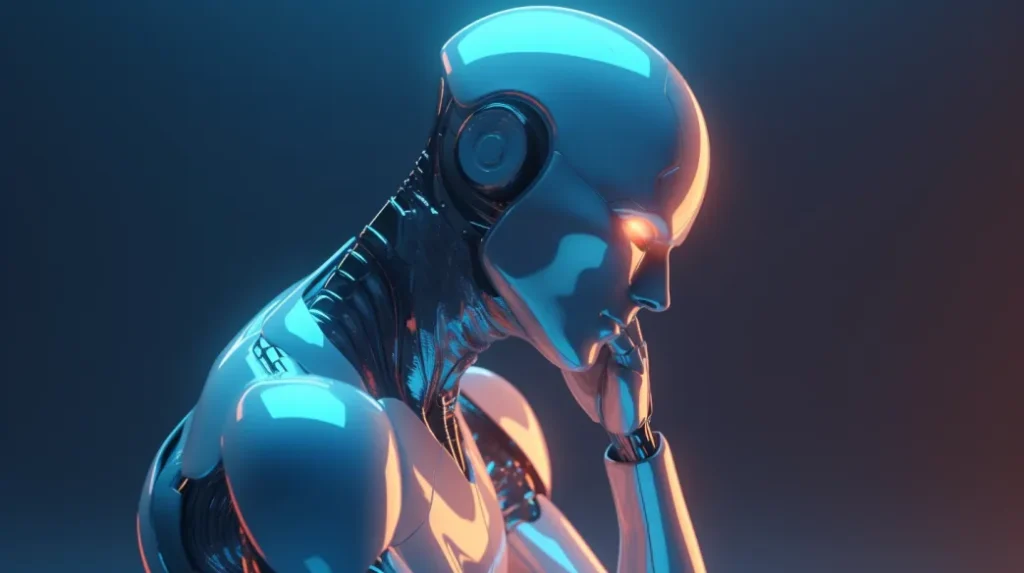How does AI make decisions?
If you’ve ever wondered “how does AI make decisions?”, you’re not alone. It’s a question as fascinating as it is perplexing, kind of like wondering why cats love boxes so much, or why we can’t resist popping bubble wrap. In essence, AI makes decisions based on algorithms that respond to models and data.
But don’t worry, we’re not just going to drop that techno-babble on you and leave. Stick around, and you’ll not only get a simple explanation of this complex process, but you’ll also gain insights into the intriguing world of artificial intelligence.
AI and Decision Making: It’s All About the Algorithms
AI, or artificial intelligence, is like the super-nerd of the tech world. It excels at making decisions that are too complex or too tedious for our human brains.
This isn’t because AI is smarter than us, though. It’s because it has algorithms. These are like recipes, but instead of making a batch of chocolate chip cookies, they’re making decisions.
Algorithms analyze mountains of data, identify patterns, and make predictions based on those patterns. They’re especially good at handling data, parameters, and variables that are so complex or voluminous they leave humans cross-eyed and reaching for the nearest coffee pot.
The Human Factor in AI Decision-Making
As much as we love to romanticize AI, it’s not perfect. It lacks qualities that we humans have in abundance, like empathy, ethics, and morality. These are the elements that help us see the bigger picture and reason behind decisions.
Imagine AI as a very diligent, very fast, but somewhat literal-minded employee. Give it a clear task, like sorting M&Ms by color, and it’ll do it flawlessly. But ask it to choose the best M&M color for a wedding based on the couple’s personalities, and it’ll be as lost as a penguin in a desert.
That’s why human intervention is still essential in AI-based decision-making. Humans can override erroneous or unfair results and guide AI systems in making decisions that align with our values and objectives.
The Subtle and Profound Impact of AI
AI systems can profoundly impact decision-making, even in small, subtle ways. Consider online shopping. AI algorithms can analyze your browsing behavior, past purchases, and even the time you spend looking at certain products.
Based on this data, the AI will suggest products you might be interested in. It might seem like a minor convenience, but these decisions can significantly influence your buying behavior.
However, AI isn’t ready to make unsupervised decisions. It’s like a toddler with a supercomputer. It can do a lot, but it needs a responsible adult in the room to ensure it doesn’t create chaos.
AI and Entrepreneurship: A Synergistic Symphony
Now, imagine the world of entrepreneurship as a vast, bustling marketplace, filled with passionate individuals brimming with innovative ideas.
They’re like chefs, each with their secret recipe, ready to whip up a storm. But even the most talented chefs need the right tools to bring their creations to life.
Enter AI, the game-changing kitchen gadget in our analogy. The decision-making capabilities of AI have transformed the entrepreneurship landscape, just as a high-tech blender might revolutionize a chef’s preparation process.
AI helps entrepreneurs sift through mountains of data to make strategic decisions, identify market trends, and understand consumer behavior—tasks that would be overwhelmingly complex and time-consuming if done manually.
It’s like having a tireless assistant who can quickly peel a mountain of potatoes (data) and neatly dice them into valuable insights.
Moreover, AI’s predictive analytics can provide entrepreneurs with foresight, enabling them to anticipate market changes and customer needs, much like a seasoned chef predicting the ingredients they’ll need for a busy weekend.
Yet, as we’ve established, AI isn’t infallible or wholly independent. Entrepreneurs, like skilled chefs, must guide and control the AI, ensuring that it aligns with their business values and objectives.
They must balance the efficiency of AI with the human touch that brings creativity, empathy, and ethical considerations into the mix.
In the grand banquet of entrepreneurship, AI is the innovative tool that’s changing the game. But the chef—the entrepreneur—is still the one in charge of the kitchen.
Wrapping Up
In conclusion, AI makes decisions based on algorithms that sift through and analyze vast amounts of data. But while AI is excellent at dealing with complexity, it lacks the human qualities necessary for nuanced decision-making. It’s a powerful tool, but like any tool, it needs a skilled hand guiding it.
AI is transforming how we make decisions, from the products we buy to the ways businesses operate. But it’s not replacing us. Instead, it’s expanding our capabilities and helping us navigate an increasingly complex world.
So, the next time you wonder “how does AI make decisions?”, remember, it’s not just AI—it’s AI with a human touch.






